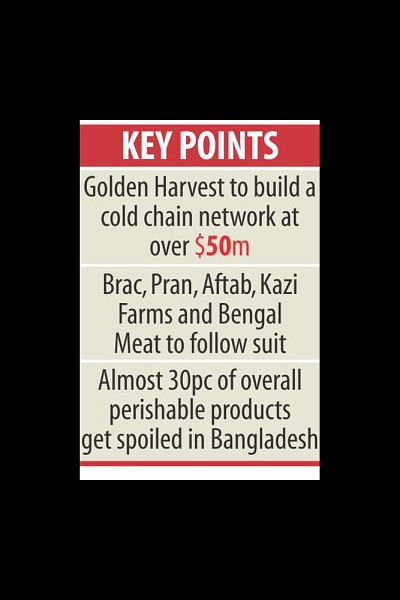Processed food makers investing more in cold chain networks

Local processed food makers are increasingly investing in building their cold chain networks to maintain the quality of products, industry insiders said.
Golden Harvest Agro Industries is setting up the country's largest cold chain network at a cost of more than $50 million (about Tk 400 crore). USAID is helping the company implement the project.
Brac, Pran, Aftab, Kazi Farms, Bengal Meat and other processed food makers are also gradually putting their money forward in developing the cold chain network.
“Cold chain development is an investment-intensive proposition,” said Zakir Ibne Hai, chief operating officer of Golden Harvest.
“There are a few companies that are involved in ice cream, frozen foods, dairy and poultry products that are investing in building their cold chain networks.”
A cold chain network is a logistics system, which helps maintain and provide a series of facilities to ensure ideal storage conditions for perishable items from the point of origin to the point of sales.
A well-developed and efficiently organised cold chain reduces waste and spoilage. The network includes refrigerators, refrigerated vehicles, chilling centres and storage facilities. Bangladesh imports all this equipment.
A lack of proper storage facilities spoils perishable products in Bangladesh. It is almost 30 percent of overall produce, according to some estimates.
So far, in the first phase, Golden Harvest has invested approximately $15 million in infrastructure and USAID has put $5 million in the form of technology transfer, capacity building and support services.
Three collection centres have been established by Golden Harvest for aggregation, sorting, grading and packing of produce in proper containers. These producers have been linked with Golden Harvest to supply vegetables and poultry.
The company has also established nine cold storage units with capacities of 90,000 litres and purchased 30 refrigerated vans as well as thousands of refrigerators for the outlets to keep food safe.

“This is a long-term investment effort where the first phase has seen this level of resource mobilisation. In the next phase, spanning over the next four years, we would channel the remaining resources,” said Hai.
Taufiqur Rahman, director of dairy and food industries of Brac, said they are also investing in building a strong cold chain network.
“Brac has invested around Tk 50 crore to build the network,” said Rahman.
Pran, another emerging player in the processed food segment, also plans to invest more on the cold chain network.
“We have invested on refrigerators and refrigerated vehicles,” said Kamruzzaman Kamal, marketing director of Pran-RFL Group.
Pran plans to expand its business to frozen foods and value-added products, such as ice cream and butter, for which the company has to build a strong cold chain network, said Kamal.
Managing a food supply chain has inherent challenges that require all players in the supply chain to adhere to stringent operational practices, including maintaining temperature.
Different products need different temperatures to ensure that the products are safe for consumption.
For example, frozen products should be maintained at -18°C or below (at a maximum fluctuation of 3°C) and fresh fish, shellfish and their products should be kept at a temperature as close as possible to 0°C. Market players said there are other challenges as well.
High import duties on equipment such as vehicles, freezers, chillers and storage facilities, are a big impediment. An availability of continued electricity is another critical factor in ensuring a good cold chain network, they said.
“In neighbouring India, the government has supported the industry significantly through soft duty structures, low rates of funds and other technical support,” said Hai of Golden Harvest.
“Even with a facilitating attitude from the government there, it took 20 to 30 years to build top-quality cold chains across the country.”

 For all latest news, follow The Daily Star's Google News channel.
For all latest news, follow The Daily Star's Google News channel. 



Comments